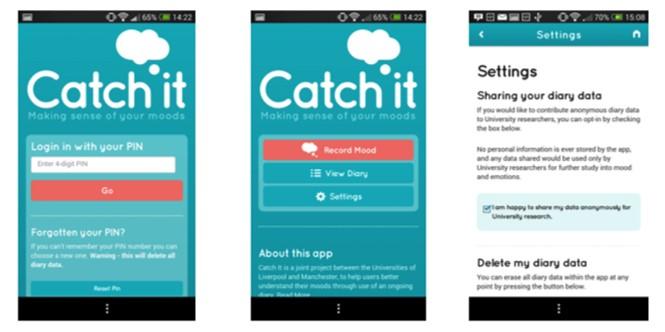Can a smartphone application help treat anxiety and depression?

These are screen grabs of the mobile phone app. Credit: University of Liverpool
The 'Catch It' app uses some of the key principles of psychological approaches to mental health and well-being, and specifically Cognitive Behavioural Therapy (CBT). Helping users better understand their moods through use of an ongoing diary.
CBT is a therapy that can help you manage your problems by changing the way you think and behave. It is most commonly used to treat anxiety and depression, but can be useful for other mental and physical health problems.
Effective therapies
The widespread use of mobile phones makes effective therapies such as CBT potentially accessible to large numbers of people.
The 'Catch It' app takes users through a process referred to as “Catch it, Check it, Change it”. 'Catch it' aims to help the user identify thoughts and thinking styles associated with a shift in mood or a particular emotion.
The study, conducted by researchers from the University of Liverpool's Institute of Psychology, Health and Society (IPHS), the University of Liverpool's Computer Services and the University of Manchester's School of Psychological Science, has been published in the British Journal of Psych Open.
Impacting negative moods
Professor Peter Kinderman, said: “This type of therapy cannot remove problems, but it can help people deal with them in a more positive way. It is based on the concept that your thoughts, feelings, physical sensations and actions are interconnected, and that negative thoughts and feelings can trap you in a vicious cycle.
“Our research examined the uptake and usage rates of this application along with the faithfulness of user responses to CBT principles and their impact on reported negative and positive moods.”
A relatively modest proportion of people chose to download the app, once used, the app tended to be used more than once. Also, 84% of the user-generated content was consistent with the basic concepts of CBT.
Beneficial effects
Professor Kinderman, adds: “There were statistically significant reductions in negative mood intensity and increases in positive mood intensity.
“Smartphone apps have potential beneficial effects in mental health through the application of basic CBT principles. More research with randomised controlled trial designs should be conducted.”
###
The full study, entitled 'The feasibility and effectiveness of a novel CBT smartphone app: 'Catch It'', has been published in BJPsych Open today and can be found here once the embargo lifts http://bjpo.
Media Contact
All latest news from the category: Health and Medicine
This subject area encompasses research and studies in the field of human medicine.
Among the wide-ranging list of topics covered here are anesthesiology, anatomy, surgery, human genetics, hygiene and environmental medicine, internal medicine, neurology, pharmacology, physiology, urology and dental medicine.
Newest articles

Properties of new materials for microchips
… can now be measured well. Reseachers of Delft University of Technology demonstrated measuring performance properties of ultrathin silicon membranes. Making ever smaller and more powerful chips requires new ultrathin…

Floating solar’s potential
… to support sustainable development by addressing climate, water, and energy goals holistically. A new study published this week in Nature Energy raises the potential for floating solar photovoltaics (FPV)…

Skyrmions move at record speeds
… a step towards the computing of the future. An international research team led by scientists from the CNRS1 has discovered that the magnetic nanobubbles2 known as skyrmions can be…





















